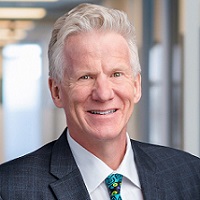 By Nick van Terheyden aka Dr Nick, Principal, ECG Management Consulting
By Nick van Terheyden aka Dr Nick, Principal, ECG Management Consulting
Twitter: @drnic1
Host of Healthcare Upside Down – #HCupsidedown
In my early days of practicing medicine, I spent nights and weekends working in healthcare but also maintained a “regular” job as a computer programmer at Shell International Petroleum in London. I found myself in the corporate office world working the standard 9 to 5 with a lunch break.
But Shell was a forward-thinking company with resources. Lunch in this environment was a full-service restaurant with multiple choices, all provided to employees at no charge.
My experience in the healthcare world was diametrically at odds with this. I watched our hospital accountants close the nighttime restaurant service and replace it with vending machines filled with unappetizing, unhealthy, prepackaged meals to save money.
Episode NOW on Demand
When I asked someone at Shell why they spent so much on a complimentary food service, the answer was clear: the company viewed this as keeping their employees healthy and productive. It was worth the investment. For many workers, this could be the best meal they get every day, and it was fresh and nutritious. There was also a full gym, squash courts, and a swimming pool for exercise before and after work—again, all free.
In the wake of the pandemic, most Americans’ lifestyles have changed. We are not the same people, and we have different expectations—including what we expect from our employers.
With the so-called Great Resignation and the challenge of keeping and attracting new employees, employers need to rethink the benefits they offer to their workers. Society is changing, and the system of healthcare needs to change as well—shifting from sick care to well care and taking a holistic approach to the individual and the extended family.
Jeff Hogan is the president of Upside Health Advisors. On this episode Jeff explains that employers that don’t take better care of their employees risk losing them to employers that do. Here are a few excerpts.
Evolving expectations about value in healthcare.
“COVID has really exposed how bad our system is, how inaccessible it is, how unpredictable it is. When COVID started, healthcare providers and health systems that were not treating COVID directly shut down, just like everybody else did. And then we had the average American who said, ‘Here I am, I’m hiding in my home, and I can’t get treatment,’ particularly for those that were comorbid or needed a medication change. There was a clear exposure of the inadequacy or inappropriateness of our existing system. What has happened since then is the beginning of a robust conversation around outcomes and value-based healthcare. Expectations have changed forever.”
Introducing the healthcare consumer.
“Prior to COVID, the notion of the healthcare consumer was an oxymoron. And now with COVID, it seems that expectations have changed dramatically, and not just for healthcare. In general, Americans are looking at things very differently. I was listening to an economic summit and wrote down a quotation that more than half of Americans’ lifestyles have changed. We are not the same people. Everything in our lives is up for reconsideration. And [the speaker’s] warning to the CEOs of American companies was that you are going to have to do more to attract and keep employees. Your culture is going to have to be better, you’re going to have to do things that actually show that [your employees] are important. And now we’ve got this new employee out there who has choices, who can go elsewhere, who is saying, ‘you’ve got to do better by me—I want you to give me a health plan that gives direction, that has quality outcomes, that gives me access to care 24/7 even in my home, and that gives me appropriate behavioral resources.’”
What a healthcare employee wants.
“The most intelligent employers, the most motivated employers, those who really need to provide a better way, are finally looking at their employees and saying, ‘we are going to look at you holistically.’ That means they’re not just considering their employer-sponsored health plan, with benefits like time off and vacation and nutrition. The assets they bring to bear at the place of employment, whether it’s on-site care, advanced primary care, home care, behavioral resources, infertility benefits…what do our employees actually want and need? Are you asking them?”
About the Show
The US spends more on healthcare per capita than any other country on the planet. So why don’t we have superior outcomes? Why haven’t the principles of capitalism prevailed? And why do American consumers have so much trouble accessing and paying for healthcare? Dive into these and other issues on Healthcare Upside/Down with ECG principal Dr. Nick van Terheyden and guest panelists as they discuss the upsides and downsides of healthcare in the US, and how to make the system work for everyone.
This article was originally published on the ECG Management Consulting blog and is republished here with permission.
